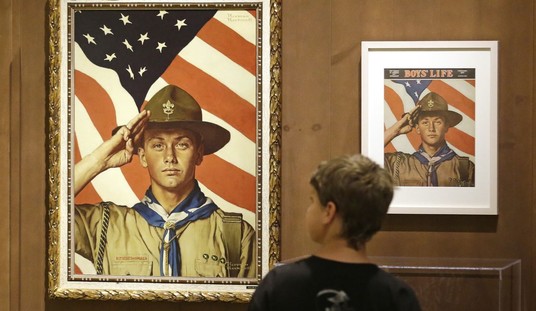The depth of “The Tragedy of the Times Editorial Page” is charted by John Steele Gordon at Commentary:
The New York Observer ran an article yesterday not only on how awful the New York Times editorial pages have become (hardly a stop-the-presses news item), but how fed up and in “semi-open revolt” the news side of the Times is about the editorial side. Referring to Andrew Rosenthal, the Times’s editorial page editor, one Times reporter said, “Andy’s got 14 or 15 people plus a whole bevy of assistants working on these three unsigned editorials every day. They’re completely reflexively liberal, utterly predictable, usually poorly written and totally ineffectual. I mean, just try and remember the last time that anybody was talking about one of those editorials.”
For obvious reasons, the reporter was speaking not for attribution. The article is not-to-be-missed reading, as Times reporters eviscerate the likes of Tom Friedman (“an embarrassment”) and Maureen Dowd, (“[she’s] been writing the same column since George H. W. Bush was president”).
Today, the Times’s lead editorial demonstrated just what the news-side guys are talking about. Entitled “Freeing Workers From the Insurance Trap,” it is nothing more than a slight restatement of what Jay Carney peddled yesterday at the White House news briefing. Had it been issued as a White House press release (and maybe it was, just sent only to Andrew Rosenthal), I doubt anyone would have doubted its authenticity.
RPG aficionado Moe Lane describes it as self-induced insanity, a case of “Anagnorisis:”
Don’t know that word? The invaluable RPG Trail of Cthulhu defines it in this case as “the moment that the main character pieces together the nature of the Mythos and goes to pieces:” basically, what happens is that your unlucky protagonist has an insight that allows him and her to understand the true nature of the universe. And the sudden understanding inevitably leads to madness.
So let us thus discuss the New York Times.
Freeing Workers From the Insurance Trap
The Congressional Budget Office estimated on Tuesday that the Affordable Care Act will reduce the number of full-time workers by 2.5 million over the next decade. That is mostly a good thing, a liberating result of the law.
The next sentence to that was “Of course, Republicans immediately tried to brand the findings as “devastating” and stark evidence of President Obama’s health care reform as a failure and a job killer.” Two things: 1, that’s what those findings are; and 2, we didn’t try to brand anything.
Read the whole thing. You can’t, as Moe concludes, haul a big city newspaper’s entire editorial board off to a nice white, quiet, softly-lit padded room. So responsible Timesmen — OK, let us suppose for the sake of argument that such men do exist — are doing the next best thing, which is leaking the horrors of their out-of-control situation to rival publications such as the New York Observer.
But as Roger L. Simon, our Maximum Pajamahadeen Emeritus writes today, the problem is not really an isolated quality control problem inside their publication, but a limitation of the very worldview of the left itself, the prism through which virtually everyone looking out of the floor-to-ceiling thermopane windows of 620 Eighth Avenue observes the world outside:
I certainly agree about the mind-bending banality of the Times opinion page and the windiness (at best) of Friedman. But I think the reporters are off the mark on the cause. They can blame it on Rosenthal if they wish — I have no opinion, not working there — but the real problem is far greater than any one editor.
To adopt what is becoming a modern cliché — it’s the ideology, stupid.
The Times reporters complained of the page’s uniformly negative tone, but not even S.J. Perelman or P.G. Wodehouse could write with verve in the service of modern liberalism. You can’t bring a dead horse to life. No writer is that good — at least on a regular basis.
How, for example, do you write an eloquent defense of Obamacare or justify the administration’s actions in Benghazi without resorting to the kind of obfuscation that makes for convoluted, or at best tedious, writing? How do you advocate for yet more government programs in a country already so mired in debt it’s hard to see how it will ever get out? It’s Keynesian economics itself that’s the problem, not Paul Krugman.
Although I admire many of the writers at the Wall Street Journal, let’s admit they have a lot more to work with, a plethora of easy targets for a man or woman with even a modicum of wit. We live in an era when readers are distrusting big government more than ever. Where does that leave the NYT, that great tribune of of ever-expanding government? With a bunch of grumps on their hands.
In his new article today titled “Woody Allen, and why cultural conservatives always had a point,” Matt Lewis of the Daily Caller observes the Cassandra-like nature of conservatism:
Long after everyone ceased keeping score, media elites began belatedly conceding that the culture their worldview produced and promoted in the 1960s, 70s and 80s was pernicious. When writers at the Washington Post, the Atlantic, and New York magazine all concede Dan Quayle was right about Murphy Brown, you know something is up.
These admissions are finally proffered because there is always a niche for “man-bites-dog” contrarian columns, because the concession no longer costs anything politically (it’s too late to help Dan Quayle!), because second-wave feminism was particularly misguided and counterproductive, and (I’d like to think), because modern liberals — the intellectually honest ones, at least — have had time to see some of the negative attributes their worldview hath wrought.
See also: the right’s criticisms of the Times itself, which have been percolating for quite some time.
Related: As Jim Geraghty notes, “Democrats Attacked Republicans For Saying What the CBO Says Today.”










Join the conversation as a VIP Member